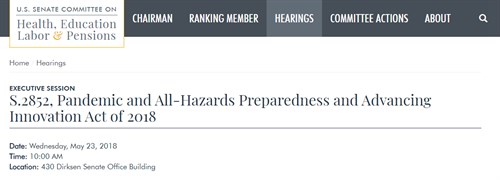One Health Principles Included in the Pandemic & All-Hazards Preparedness and Advancing Innovation Act of 2018
An important piece of bipartisan legislation is currently making its way towards authorization in our nation’s capital. The Pandemic and All-Hazards Preparedness and Advancing Innovation Act of 2018 provides a framework for pandemic prevention, preparedness, and response through organizational initiatives, public health efforts, and innovative medical counter measures among many other strategies outlined in the bill.
What’s especially striking about the 2018 version of the bill is the inclusion of “zoonotic disease, food, and agriculture” in our national health security strategy, thus outlining the necessity of a One Health approach.
During a Health, Education, Labor & Pensions (HELP) Committee Hearing on May 23, 2018, Senator Tina Smith (MN) described her state’s intimate knowledge of why One Health principles must be factored in to pandemic preparedness:
“Both Minnesota and Indiana were hard hit by the avian flu outbreak that we experienced a few years ago, and this outbreak led farmers to culling nearly 50 million birds and it resulted in an estimated 3.3 billion dollars in losses for our poultry farmers, animal feed producers, and related industries. And it also had a significant human public health implications because a wide ranging variety of vaccines are cultivated using eggs. So, our One Health idea gets to the point that human health and animal health are linked and that they both are related to changes in our environment, and without adopting this kind of approach and encouraging researchers to study animal and human health and encouraging them to work together, we’re not going to be able to effectively prepare for and prevent disease outbreaks that affect both animals and humans.”
The inclusion of these principles and Senator Smith’s remarks represent a growing awareness as to why the link between animal, human, and environmental health complicates our ability to maintain health security and to prevent, detect, and respond to infectious diseases with pandemic potential. It’s encouraging to see lawmakers and the public at large champion One Health as a necessary way for moving forward. Texas A&M University’s College of Veterinary Medicine & Biomedical Sciences and Global One Health hope to encourage this growing awareness and to continue to establish themselves as an emerging leader in global ONE HEALTH security.

Watch the entire HELP Committee hearing here.
